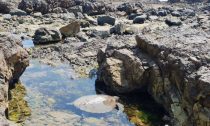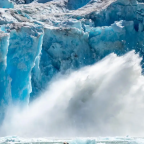
There is nothing quite like jumping into the cool ocean on a hot summer’s day, but this year there is a distinct chill in the water at some New South Wales coastal tourism hotspots. And it is not just swimmers feeling the effects.
According to the Bureau of Meteorology, the ocean temperature between Port Macquarie and Newcastle is about four degrees cooler than normal.
“The coldest place is between Seal Rocks and Crowdy Head. We’re seeing temperatures there of between 18–19 degrees [Celsius] on average,” ocean analyst Jessica Sweeney said.
“Occasionally we’ve got measurements down to 16 degrees at Crowdy Head — that’s pretty chilly.
“Comparing it to previous years for this time of year, it’s in the lowest 10 per cent of temperatures seen over the years so it’s certainly colder than normal.”
Tough going for turtles
Slightly north, in Coffs Harbour, turtles are feeling the cold, with one marine rescue and rehabilitation service recently taking in 10 ailing turtles in just one day. Eight of the turtles were found washed up in rockpools at Arrawarra.
“What we think is happening is we’ve had about six weeks of north-east wind and what happens with north-east winds is we get cold water coming in and replacing that nice clear water and it’s very turbid,” Dolphin Marine Conservation Park veterinarian Duan March said.
“Also, there’s this passive drift where the turtles get pushed southward by the north-east current, so any kind of north-facing beaches tend accumulate these animals.”
Dr March said the turtles affected by the swells and poor visibility tended to get washed into the rockpools, with some becoming stuck by the tides.
While the current conditions were making life difficult for some marine species, Dr March said there was a huge upside for others.
“The ecosystem is a complex being and this water coming in, and the algae it brings, and the weed that it brings, brings a whole lot of nutrients that a whole lot of different marine organisms are going to feed on, and that the ecosystem needs,” he said.
Jessica Sweeney said persistent north-easterly winds were leading to something known as upwelling.
“Which is a phenomenon caused by Ekman Transport,” she said.
“This is what happens when you have persistent winds blowing across the ocean from a particular direction, and in the southern hemisphere, due to the Coriolis effect, the water travels to the left of the wind.
“On the east coast of Australia, if you have north-easterly winds blowing for a sustained period of time, say a couple of days, the water travels away from the coast, about the top 30 metres of water.
“When that moves away from the coast something has to replace it, so what happens is the cold water down lower in the ocean comes up, and we call that upwelling … so it’s a lot colder, denser, more nutrient-rich water from the deeper ocean.”
It is not just marine life that is being affected by the drop in ocean temperature.
Danny Green, a commercial trap and line fisher from Coffs Harbour, said he was catching fewer fish this year compared to last year.
“Generally the mackerel tend to come through February, March, April as well, and this time last year I did see a couple of mackerel in the middle of January whereas this year I don’t think anybody’s been catching much as yet, but it’s still a bit early to tell.”
Dive operator Peter Huettner, from Port Macquarie, said the north-easterly winds had also increased the turbidity of the water.
“We’ve had the boat out probably once this season because of the north-easters,” he said.
“In previous years our busiest time is from Christmas Day to the second week in January and we normally get out about 20–30 times in that time, and this year we’ve only got out once.
“While it’s not building the swell up, it’s making the ocean very sloppy, so when we get out there we can’t sit in anchor because the boat rocks too much, people get too seasick.
The north-easterlies also means red weed has been affecting Port Macquarie beaches for several weeks.
“Those north-easterlies tend to keep that red weed in close to shore and it’s not until we get a strong southerly wind or southerly swell for a few days [that] it’ll hopefully wash … out,” lifeguard supervisor James Turnham said.
It has also made for some rough conditions.
While the cold water was making life difficult for some wildlife, it offered protection to others.
Coffs Harbour dive operator Mike Davey said, while the water temperature close to shore was cool, the water further out was as warm as 26C.
Mr Davey said a change to water temperatures that high could be detrimental.
“This is what we saw with a bleaching episode a few years ago; if we get the water temperature staying above 24 degrees for longer than a few days, it will start damaging the corals.”












Social Profiles